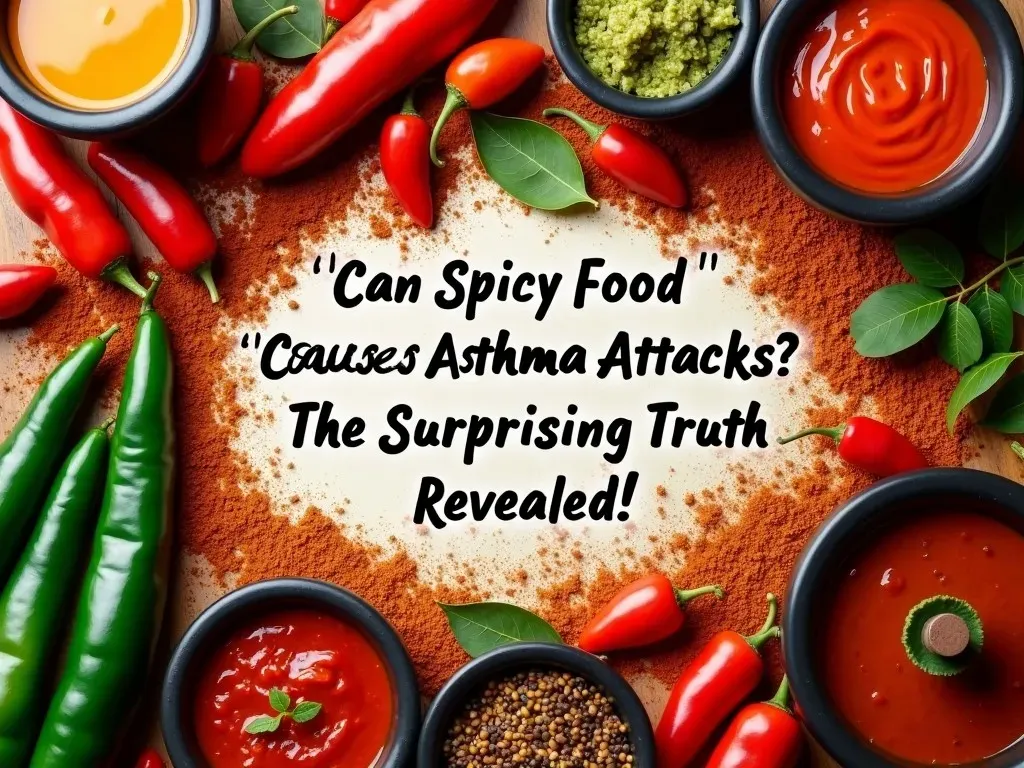Can spicy food cause asthma attacks? This question often crops up among those managing asthma, raising concerns about dietary triggers and respiratory health. While spicy foods contain various ingredients that might contribute to asthma symptoms, the relationship isn’t straightforward.
Understanding Asthma and Its Triggers
Asthma is a chronic condition characterized by inflammation and constriction of the airways, making it challenging to breathe. Symptoms can include wheezing, shortness of breath, chest tightness, and coughing. Given the variability of triggers among asthmatic individuals, understanding the role that food—particularly spicy food—plays in exacerbating asthma is crucial.
Common Food Triggers for Asthma
Before delving into spicy foods specifically, let’s examine some common food triggers linked to asthma exacerbations:
| Food Category | Possible Triggers |
|---|---|
| Sulfites | Found in dried fruits, wine, pickles, and shrimp |
| Nitrates/Nitrites | Present in processed meats, such as hot dogs and bacon |
| Dairy | Milk and cheese can cause mucus production for some |
| Wheat | Gluten sensitivities may trigger asthma symptoms |
| Shellfish | Common allergen that can provoke reactions |
Source: WebMD
Can Spicy Food Trigger Asthma?
Spicy food, often a blend of spices containing chili, cayenne, or black pepper, can elicit different responses in individuals with asthma. Here are key points to consider:
-
Capsaicin and Airway Irritation: Capsaicin, the active component in chili peppers, may irritate the airways for some people, leading to coughing or shortness of breath. However, not everyone experiences this reaction.
-
Histamine Responses: Some spices may induce a histamine response, potentially exacerbating asthma symptoms. Foods high in histamine (like fermented products) along with spicy ingredients might amplify this effect.
-
Individual Sensitivity: The degree of sensitivity to spicy foods varies. While one person might enjoy a spicy meal without repercussions, anOther might find that it leads to an asthma flare-up.
Studies Indicating Spicy Food Effects
A recent survey and a few studies explored the relationship between spicy food and asthma symptoms:
-
Study A: A small-scale study indicated that participants with asthma reported increased cough and wheeze after consuming spicy food. The findings were more evident in individuals with pre-existing respiratory conditions or heightened sensitivity to irritants.
-
Study B: A larger cohort study noted that spicy food, when consumed frequently, correlated with increased asthma symptoms in some participants, particularly within specific ethnic groups who traditionally incorporate a high amount of spices in their diets.
| Study | Findings |
|---|---|
| Small Scale Study | Increased cough/wheeze after spicy meals |
| Larger Cohort Study | Correlation between spice intake and asthma symptoms |
While these studies show a connection between spicy food and asthma attacks, further research is essential to establish clearer causal links.
Frequently Asked Questions (FAQs)
1. What Types of Spicy Foods Should Asthmatics Avoid?
Asthmatics shouldn’t categorically avoid all spicy foods, but it may be wise to limit:
- Dishes with high chili content
- Foods cooked with heavy spices (e.g., curries)
- Sauces that are excessively spicy
2. Are There Any Safe Spicy Foods for People with Asthma?
Not all spicy foods will trigger asthma symptoms. Options include:
- Moderate use of certain spices (e.g., ginger, turmeric)
- Dishes that balance heat with cooling ingredients (like yogurt)
3. Can Other Ingredients in Spicy Food Cause Asthma Attacks?
Yes, accompanying ingredients can play a role:
- Dairy and creamy sauces may lead to mucus production.
- Certain preservatives (like sulfites) may exacerbate symptoms.
4. How Can I Identify My Food Triggers?
Keeping a food diary can help identify patterns. Take note of:
- Foods consumed prior to asthma symptoms
- Severity and type of symptom experienced
5. Should I Consult a Doctor About Dietary Changes?
Yes, it’s advisable to consult with healthcare providers, especially if you’re considering significant diet changes that may affect your asthma management.
Conclusion
In summary, while spicy food can potentially cause asthma attacks in sensitive individuals, the extent varies significantly from person to person. Those managing asthma should stay attuned to their body’s responses and consult with healthcare providers about dietary habits. By doing so, they can better navigate their conditions while still enjoying an array of foods.
For further reading on asthma and its triggers, please visit AAFA.

Maintaining awareness of food intake and consulting healthcare professionals can assist asthmatics in making informed choices regarding their diet and symptom management.
